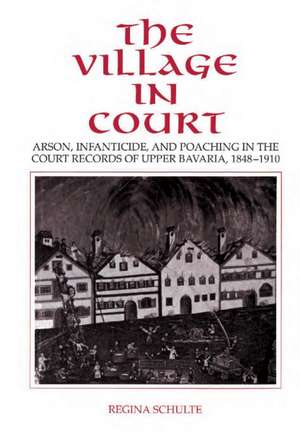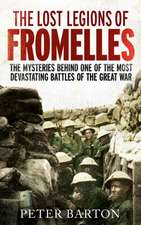The Village in Court: Arson, Infanticide, and Poaching in the Court Records of Upper Bavaria 1848–1910
Autor Regina Schulte Traducere de Barrie Selmanen Limba Engleză Hardback – 28 apr 1994
Preț: 678.32 lei
Preț vechi: 762.15 lei
-11% Nou
Puncte Express: 1017
Preț estimativ în valută:
129.88€ • 135.24$ • 107.76£
129.88€ • 135.24$ • 107.76£
Carte tipărită la comandă
Livrare economică 14-28 februarie
Preluare comenzi: 021 569.72.76
Specificații
ISBN-13: 9780521431866
ISBN-10: 0521431867
Pagini: 208
Dimensiuni: 158 x 236 x 18 mm
Greutate: 0.41 kg
Ediția:New.
Editura: Cambridge University Press
Colecția Cambridge University Press
Locul publicării:New York, United States
ISBN-10: 0521431867
Pagini: 208
Dimensiuni: 158 x 236 x 18 mm
Greutate: 0.41 kg
Ediția:New.
Editura: Cambridge University Press
Colecția Cambridge University Press
Locul publicării:New York, United States
Cuprins
Introduction; 1. The break-up of the village; 2. The peasant as seen by the middle class; 3. The literature on rural relations; 4. Crime as a medium of historical anthropology; 5. Landscape with villages; Part I. Peasant Society and the Individual: 1. Fire in the village: i. The arsonist; ii. Work; iii. The village; iv. The families; 2. The mad-doctor's gaze: i. From the social symptons to the physical; ii. Female arsonists and puberty; iii. Catharsis or disease?; Part II. The Status of Women and the Place of Children: 1. The bridal wagon; 2. Silent births: i. Infanticides; ii. Time spent as a maid; iii. Relationships between unmarried farm servants; iv. 'With the angels'; v. Gossip; Part III. The Disputed Boundaries of the Village: 1. Poaching - economics, culture and sexuality: i. 'Nothing but shoot game'; ii. A trade on the edge of the village; iii. The village goes poaching; iv. The young men; v. The reality of fantasy; 2. Domination in jeopardy: i. The provincial judge - attempts to mediate; ii. The 'good natured mountain folk' and the 'stormy times'; iii. Manhood and execution; iv. A fantasy of reconciliation; Conclusion: on the threshold between two worlds.
Recenzii
"Schulte's discussion of infanticide goes beyond what we know of this act for earlier periods...and therefore mertis attention." Canadian Journal of History
"This innovative book establishes an intersection between structuralist analysis and psychohistory in a most readable way. The examination is well illustrated by actual testimony... It is certainly accessible to readers at all levels..." Choice
"This quick summary of Schulte's book by no means does justice to the manifold ways in which the author shows 'how peasant society worked'....a fine work."
"This innovative book establishes an intersection between structuralist analysis and psychohistory in a most readable way. The examination is well illustrated by actual testimony... It is certainly accessible to readers at all levels..." Choice
"This quick summary of Schulte's book by no means does justice to the manifold ways in which the author shows 'how peasant society worked'....a fine work."
Descriere
In this book, first published in 1994, Schulte provides an interpretation of village life in rural Europe through a close study of court proceedings.











